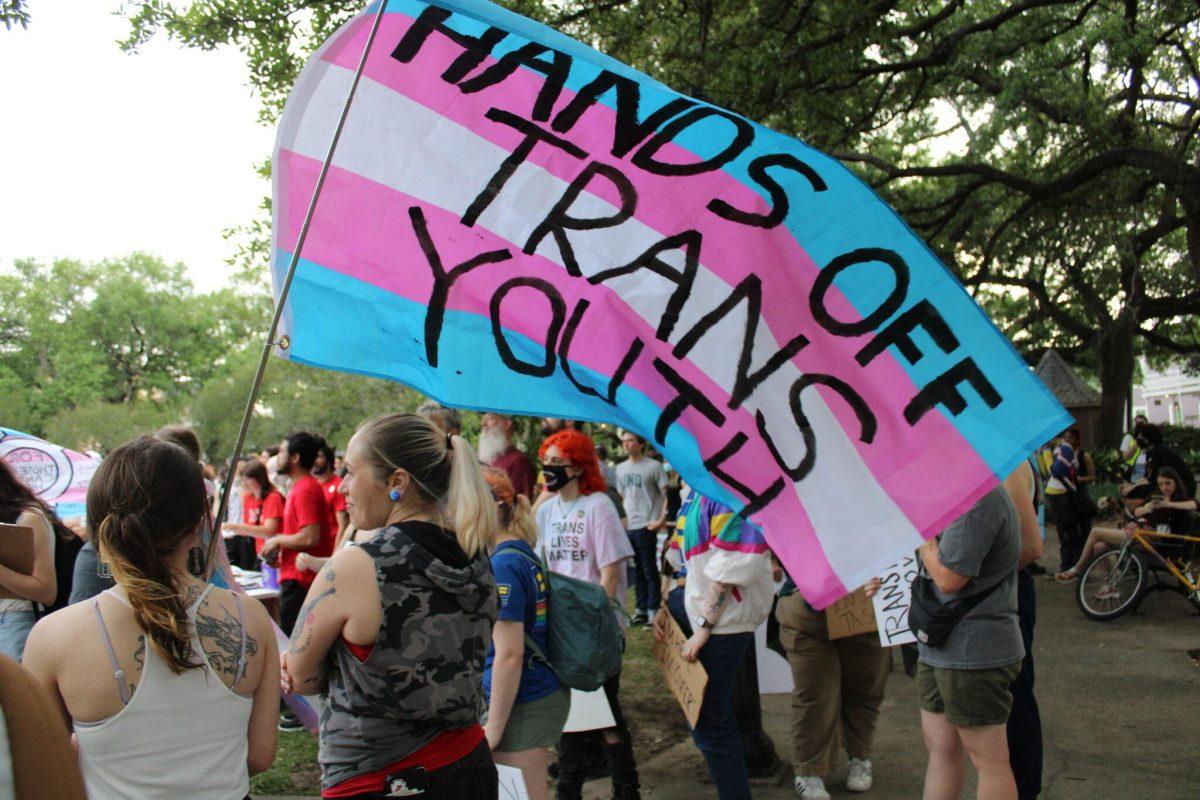Read the Louisiana Illuminator’s orginal reporting here.
Five transgender youth and their families have sued Louisiana over a ban on gender affirming health care.
The lawsuit was filed Monday in Orleans Parish Civil District Court by LGBTQ+ advocacy group Lambda Legal. It challenges Act 466, which went into effect Jan. 1. The bill bans gender affirming health care for transgender youth.
Plaintiffs in the case range from a 9-year-old transgender girl who has socially transitioned but has not yet started puberty blockers to a 16-year-old transgender boy who, as a result of the ban, will have to stop taking his hormones for several months before he turns 18. One plaintiff is identified as a Medicaid recipient living off a fixed income.
Defendants are the Louisiana State Board of Medical Examiners, its members and Attorney General Liz Murrill.
According to the lawsuit, the ban prohibits the plaintiffs from accessing necessary medical care. It says each family has considered seeking care out of state but does not want to leave their home in Louisiana.
Social transitioning refers to individuals using non-medical intervention, such as names, pronouns and clothing that more closely align with their gender identity.
More than 20 other states have passed bans on gender affirming health care, most of which have been challenged in court. Enforcement of some bans has been placed on hold until the lawsuits are litigated.
“Denying medical care to youth just because they are transgender is both unlawful and inhumane — especially when the same treatments remain available to all other minors,” Omar Gonzalez-Pagan, an attorney with Lambda Legal, said in a press release. “The Health Care Ban represents broad government overreach into the relationship between parents, their children, and their health care providers.”
Most major medical organizations endorse gender-affirming care, and a large body of research supports it.
Gender-affirming care is a catch-all term for medical treatments given to people to align their physical bodies with their identified gender. Gender-affirming care is used by transgender people, who identify as a gender different from their sex assigned at birth, as well as cisgender people, who identify as their assigned sex.
“This health care has allowed me to be happy, healthy and my true authentic self – the boy I know I am,” plaintiff Max Moe said in a press release. “I am terrified of what the Health Care Ban will do and worry about how my mental health might deteriorate.”
Studies approximate 80% of transgender youth have considered suicide, and 40% report at least one suicide attempt. Research also indicates gender-affirming health care leads to improved mental health outcomes.
The plaintiffs and their families are identified in the lawsuit by pseudonyms for privacy and safety concerns.
The lawsuit alleges that the ban is discriminatory, as it singles out transgender youth, because cisgender youth are still able to access puberty blockers, hormones and surgeries to help them more closely identify with their identified gender. The new state law amounts to unconstitutional discrimination on the basis of sex, the plaintiffs say.
The push to approve the ban in Louisiana, as in other states, was fueled by misinformation.
During the legislative process, supporters of the ban raised concerns about minors receiving irreversible gender-affirming surgeries and that children are being left sterile, claims that are both factually questionable.
Treatments are individualized to the patient. Some young patients will be prescribed fully reversible puberty blockers, giving the patient time to consider their options.
Later, a patient may be given hormone treatments to help them go through puberty in a way that allows their body to change in ways that align with their gender identity. These treatments are partially reversible.
Gender-affirming procedures, such as top surgery, which adds or removes breast tissue, or bottom surgery, which constructs a vagina or penis, are generally not recommended for minors, according to Dr. Kathryn Lowe, a pediatrician who represents the American Academy of Pediatrics Section on LGBT health and wellness.
In rare cases, an older minor may be given top surgery after extensive counseling, although there is no evidence such procedures are available in Louisiana.
The sponsor of the transgender care ban, Rep. Gabe Firment, R-Pollock, also raised concerns about the harm of puberty blockers, but medical providers consider them safe and have used them for decades to treat children who enter puberty too early.
The lawsuit specifically calls out lawmakers for disregarding facts, arguing they ignored hours of testimony from qualified medical professionals and affected individuals, many of whom warned about the ban’s potential impact on the mental health of vulnerable youth in favor of “misinformation and unfounded stereotypes.”
The ban was passed in the 2023 regular session but vetoed by former Gov. John Bel Edwards, a Democrat. The legislature overturned Edwards’ veto, just the third time the lawmakers have overturned a governor’s veto since 1973.
At the time, Edwards said he believed courts would strike the ban down, calling it unconstitutional.
Transgender youth sue Louisiana over gender affirming health care ban
January 8, 2024
A transgender Pride flag is covered with the words “Hands Off Trans Youth.” Hundreds of people gathered Friday, March 31, 2023, at Washington Square Park in New Orleans for a march to mark Transgender Day of Visibility.




